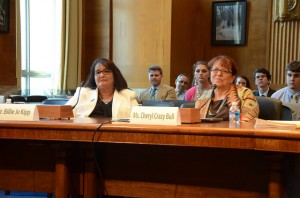UPDATE: Language revitalization bills head to the floor.
Bipartisan support for the Native Language Immersion Student Achievement Act (H.R.4214/S.1948) and The Native American Languages Reauthorization Act (H.R.726/S.2299) has led to both bills’ approval in the Senate Committee on Indian Affairs. The bills will now be considered before the full Senate.
“Native Languages are vanishing at an alarming rate, and with them the culture, tradition and knowledge that are so important to the future of Indian Country,” said Senator Jon Tester (MT, S.1948 lead sponsor, S.2299 co-sponsor). “This bill will not only revitalize Native languages, it will also keep kids in school and lead to greater pride, academic achievement and economic growth in Indian Country.”
The Linguistic Society of America is working closely with the Committee on Endangered Languages and their Preservation (CELP) to raise awareness within Congress about the importance of Native American language revitalization. In June, the Senate Committee on Indian Affairs examined two bills that are pending in both houses of Congress that would promote indigenous languages.
The Native American Languages Reauthorization Act of 2014, sponsored by Rep. Ben Ray Lujan (D-NM), would reauthorize appropriations for a grant program to ensure the survival and continuing vitality of Native American languages. The grant program funds institutions such as tribal community colleges and language preservation programs.
The Native Language Immersion Student Achievement Act is sponsored by Rep. Tom Cole (R-OK), and would amend the Elementary and Secondary Education Act of 1965 to authorize the Secretary of Education to award grants to schools and private or tribal nonprofit organizations to develop and maintain, or improve and expand, programs that support the use of Native American languages as the primary language of instruction. Students from the prekindergarten through college would benefit from the grants. In order to receive support, grant applicant must demonstrate that the schools have the capacity to provide education primarily through the Native American language. Grant recipients must support Native American language education and development, develop or refine instructional curricula for the classroom, fund training for the school staff to strengthen the language and academic goals of the school, and promote Native American language education and development.
Both bills have gained bipartisan support in the House and the Senate. As this legislation is considered in Congress, the Linguistic Society of America and CELP are calling on voters to urge their congresspersons to support the bills. Voters can write to their legislators through the National Humanities Alliance’s website and letter template here.



